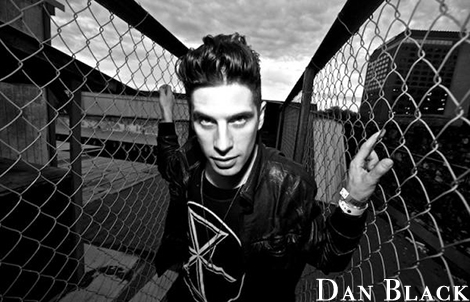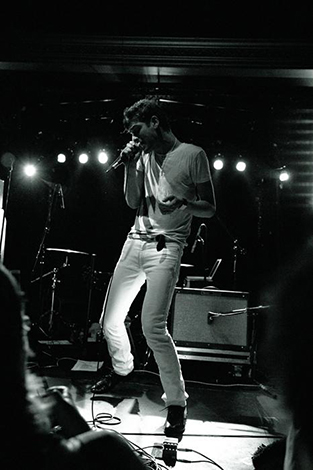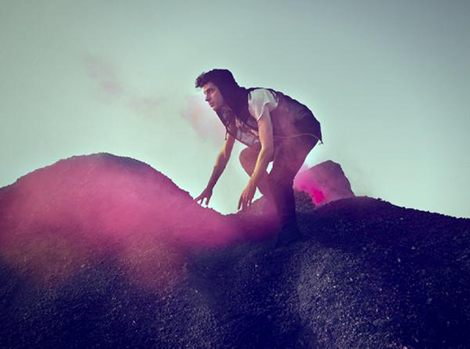
Photo by: www.DarkRoomDemons.com
Dan Black’s love and appreciation for music was spawned at a young age from his father’s expansive record collection. “I can really distinctly remember sitting on the floor while my dad listened to records… I would just sit and look at them. It was an artifact,” he told me via phone from somewhere out in London. “Each one was like a piece of art, a sculpture, it wasn’t just the wrapping for the music. It was a physical manifestation of the sound and the artist. When the artwork’s that big and you’re looking at it and pulling it a part, it’s an experience.”
To hear Dan talk about music is truly something special. For one, his English accent gives a certain officialness to all his statement, as my brother once said to me, “English accents make everyone sound smart.” But it’s not just the accent with Black, he is the real deal and his love and passion for music is as authentic as they come. Our interview actually started late, as Black missed my first call. Fittingly though, it was music that kept him from answering the phone, “sorry, I was in between two speakers,” he said said after finally reaching the line.
But good things come to those who wait, both in terms of his interview as well as for Black who went from making music on his own, to gaining success with a band, to finally breaking out worldwide again as a solo artist. Fueled by his single, “Symphonies”, Black’s album (UN) has received critical praise and through diligent promotion is slowly reaching critical mass. He’s set to land stateside again this spring/summer with an August stop at Lollapalooza. Get to know Dan Black, his run-in with the estate of Christopher Wallace, and his dad’s record collection in this in-depth interview.
RubyHornet: Your wikipedia page describes you as a “wonky pop artist”. I understand that is a UK term, can you explain what that means and how the artist community it describes feels about the title?
Dan Black: Sure. Well, first thing, I should probably go to my wikipedia page and edit that out. Wonky Pop is the name of a club in London that I’ve played a couple of times and a lot of artists have played. There’s not really a common thread. I guess it’s the post indie guitar band thing that was a huge thing in the UK and then suddenly everyone had enough of that… But in terms of who? That could mean anyone who’s music is kind of melodic and giving but at the same time you could say some grime. Is Dizzee Rascal wonky? I don’t know. I don’t mind the word “wonky” and I don’t mind the word “pop”, but if you ask me to tell you what “wonky pop” is, I have no idea… All titles are made up. I don’t mind it, but if you ask me to tell you what it means, I don’t know.
RubyHornet: Do you notice any difference in the way American audiences digest or reference your music compared to audiences in the UK?
Dan Black: I don’t know. Even in America if I play New York or I play L.A., Chicago, the audience and the way it feels is really different. It’s difficult to generalize the whole U.S. because it’s so big. To English people I’m just another English guy, but to American people I seem to appear more exotic. A lot of the music I make is inspired by a lot of Hip Hop and R&B, and people like The Neptunes and Timbaland. The kind of the more weird Swizz Beatz, and the more weird side of R&B and Hip Hop for the last 15 years. Sometimes I think UK audiences miss that… The things I put into music, I think American people find it more kind of strange and interesting. I think English guys are a bit blind to that stuff, and may not get it.
RubyHornet: It’s interesting you said that. You really broke out with your cover of “Hypnotize” over Rihanna’s “Umbrella”. How did that song come off to your core audience, were they familiar with the original track, and the significance of The Notorious B.I.G.? That original track is a really special song. Did they get it that way?
Dan Black: That was the first thing I put out solo. Before that I had been in a band. All the success of the band was on the continent Europe. It wasn’t just the UK, but France, Italy, Prague, those kind of places. When I started the band it was kind of like it is now, I had a laptop trying to do things I’m doing now but a lot more unsuccessfully. The guys that were helping me play live turned into a band and it became much more democratic. When I went solo I wanted to get back to what I was originally interested in, which is what I talked about. “HYPNTZ” came out during a bunch of experiments I was doing where was I was taking other people’s songs and recording new songs. It wasn’t really released, it was just to see if I could make the things I love live together. I did this track and thought, ‘this kind of says what I want to do really fast’, and yeah, when I posted it, a lot of people loved it. A lot of people who were fans of the band I was in before, from the way they talked about it online, I got the feeling that a lot of them, particularly, non-English speaking people weren’t that familiar with Biggie. I thought also the hit of Biggie is his delivery and the lyrics. I think a lot of fans of the kind of music I made with the band, that’s just something that’s kind of lost on them. Obviously, at the same time it brought in a whole bunch of other people and it opened up a lot of doors to me that have been closed.

Photo by: Laurent Julliand
RubyHornet: You then re-tracked the song, tweaked it, and made it into “Symphonies”, if the first single’s success was a little of a surprise, did you know what you had right away w/”Symphonies”?
Dan Black: No! It was quite a horrible process to do because we were going to release “HYPNTZ” as a single and shoot a video. Basically the night before the release, we got word from The Notorious B.I.G.’s estate that we couldn’t use it. They veto any use of samples, anything people ask for they just veto it… I had to rewrite “Symphonies” so I said, ‘f**k it, I’ll just do my own lyrics and make it fully my song.’ The process of that was such a stab in the machine of the record company and what we were trying to do. What I wrote about was what I was feeling at the time. I had finished the album at that point and I pretty much shut off that part of my mind to think about touring and merchandise and all of that stuff. And they said, ‘no, you’ve got to go back into the laboratory and come up with one more recipe.’ I really love how it came out. I particularly love the lyrics that I came up with. But my memory at the time was quite tense, but at the end it was all good.
RubyHornet: There’s a Kid Cudi remix to “Symphonies”, aside from what we talked about earlier with the Notorious B.I.G., and you mentioned Timbaland and I know you’ve used his drums on some tracks, you also said a lot of the stuff you like comes from Hip Hop. In listening to your music, I know you draw from a lot of genres, take what you like from different genres and then put it in your own music. What is it about Hip Hop music that grabs you, what’s that part that you take in and then turn back out with your own touch?
Dan Black: At heart it’s kind of a paradox, cause it’s extremely experimental. It’s the most cutting edge pop music. It’s able to be extremely experimental and pretty pop like, ‘wow, what is this thing I’m hearing in my ears?’ And it still ships a huge amount of records, which no one else can really do in any other genre not on the same dramatic scale. Missy Elliot comes out with completely insane tracks made out of whatever it is, insects over f**king 40 books made into a beat and looped and it’ll be a worldwide smash hit. I just find that really exciting… I think it’s kind of fresh and exciting. Lately Hip Hop’s got a bit more conservative which is sad, but the the late 90’s to mid 2000’s it was amazing to me and continually reinventing itself and getting more and more extreme and more out there, and that really appeals to me.
RubyHornet: I read that part of your range and diversity in taste/styles comes from your dad’s extensive record collection. Beyond opening you up to different sounds, and artists, did actually having and seeing the records give you any other appreciation for music, or respect for the art?
Dan Black: I can really distinctly remember sitting on the floor while my dad listened to records… I would just sit and look at them. It was an artifact. Each one was like a piece of art, a sculpture, it wasn’t just the wrapping for the music. It was a physical manifestation of the sound and the artist. When the artwork’s that big and you’re looking at it and pulling it a part, it’s an experience… I’m thinking about it retrospectively, but as a little kid I just thought of them as a really fascinating object… I can remember the smell of records… There’s something for every sense, the feel of it, the smell of it, the look of it, the sound, even the touch. And also, I wasn’t allowed to look at them without my dad being there and I had to be super careful. There was a link to how people felt about music then and how you had to buy it, and take care of it. They were fragile and the records were to be treated with absolute care or they would get f**ked up. Whereas now it’s just a bunch of numbers in a machine that you can steal for nothing. It’s funny how all the value of music in so many different ways has decreased. It’s obviously nobody in particulars fault, but it’s just funny. They were like these fossils that you had to be careful with.
RubyHornet: Speaking of the value of music, your work takes a tremendous amount of time, assuming you dig for a lot of samples. How does the time you put into an album compare to the amount of time pushing and promoting it? It seems like no matter what, the artist has to champion their own cause.
Dan Black: Big time. That’s true. It’s starting to feel disproportionate just because everything staggers out, especially at this stage in my career. It’ll be one country, then three months out it’s released in another country. It’s not all at once, so I have to start at zero. But, I want as many people as possible to connect with the record so I’m prepared to do it. Also, luckily I can afford a computer and I can create and keep myself going. It’s doable. But ask me in another year.
RubyHornet: I’m wondering if any other artists that do a considerable amount of sampling and chopping such as the Dust Brothers or DJ Shadow had any influence on you or if you check for their work?
Dan Black: Absolutely, yeah. I love both of those artists massively. Speaking of the Dust Brothers, Paul’s Boutique was a huge deal for me when I was younger. Entroducing… is a massive seminal record and I was influenced by that. I think I was at the right age when things like 3 Feet High and Rising, the Prince Paul stuff and things were coming out. You can do that now, but you have to do it a different way. Back then you could go, ‘look it’s this and this’. All the DJs now, and things like Girl Talk is all very fascinating to me. It’s like writing songs. When you write a song it’s basically taking other people’s ideas in your mind and putting them together in unique ways. You’re pretty much stealing other people’s ideas. The idea of making a song, the idea of writing lyrics, the idea of a verse, the idea of a chorus, most of it someone else’s idea. When people write songs they’re not really bringing that much to it and I like the idea of when you use samples…
More info at Dan Black can be found at his website.

Photo by: N/A
